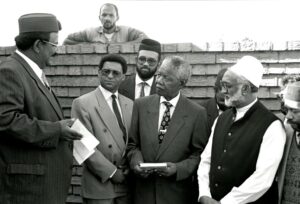
We continue with our series of articles by MYM stalwart, Fuad Hendricks. This piece focuses on Mandela, and the next instalment will focus on Tuan Guru; reflecting on how these leaders add value and significance to our contemporary lives.
The stories we tell our children, of heroes and villains rooted in our South African history, could be inspirational.
As parents we are mindful, that some people’s lives are an inspiration to us, and others a caution.
If South Africa’s former first venerated President of a liberated South Africa, Nelson Mandela (Madiba) and Tuan Guru were destined with the opportunity to meet personally during the same historical period on South African soilthey would have found much in common in terms of their shared struggle against colonialism and man’s inhumanity to man.
Freedom Fighters Madiba and Tuan Guru were separated by time but connected by their humanitarianism and civilisational values. Madiba was born in 1918 and Tuan Guru in 1712.
They are part of our South African past, but we need their moral compass to make good future and futuristic decisions in our individual and collective lives. They are not sell-by date personalities irrelevant to the shaping of our individual and collective lives in the contemporary South African context.
“Every generation is born for its own time,” is the perspective of the esteemed leader Khalif Ali ibn Talib, also known as an Imam.
Benefitting from Mandela and Tuan Guru
How could generations who are born fortheir own time benefit from the leadership roles and characteristics of Madiba and Tuan Guru who lived in different contexts and periods?
Both leaders were part of civilisations which outlived the onslaught and domination of colonialism but likely coexist todaywith the lingering Eurocentric supremacy.
Madiba often highlighted his upbringing and sense of community rooted in the African culture, way of life, and civilisation.
“The Xhosa are a proud and patrilineal people with an expressive and euphonious language and an abiding belief in the importance of laws, education, and courtesy. Xhosa society was a balanced and harmonious social order in which every individual knew his or her place. Each Xhosa belongs to a clan that traces its descent back to a specific forefather. I am a member of the Madiba clan, named after a Themba chief who ruled in the Transkei in the eighteenth century. I am often addressed as Madiba, my clan name, as a sign of respect.”
Historically, this communal, and natural way of life make up the characteristics of South African tribes or clans of which the Zulus are the largest formation. These traditions and way of life form part of the national character of our diversity as a country.
Coupled with this was the extended family and tribal support which contributed to Madiba’s blooming youth. It was an environment where he felt loved, a sense of belonging, and social connectedness. His sense of organisation and being part of a collective and the tribal context planted the roots for his communal affinity and social activism.
This was the core of his makeup. His formative leadership qualities were later refined and further developed when he assumed his role in the African National Congress, the ANC Youth League, and its military wing uMkhonto we Sizwe (MK).
His upbringing contributed greatly to the statesman he would later become. It was the basis of the leadership attributes which he would later further raise to a level of international best practice.
Chiefly, Madiba’s life as an African hero who succeeded to triumph over his adversaries counters the African pessimism narrative.
Likewise, Prof Fatima Meer’s enlightening and instructive point in her book, on Nelson Mandela, Higher than Hope, that some biographies are a “people’s essential heritage.”
Madiba’s biography, LONG WALK to FREEDOM, was not an ego trip but a record and testimony of a people’s struggle for liberation, economic, political, cultural, and civilisational self-determination.
Leadership skills
Amongst, the many leadership skills of Madiba, his emotional intelligence was one of the inherent and nurtured gifts which empowered him at best throughout his life.
His battle tested emotional suffering of 27 years of imprisonmentsharpened him as a leader. The soldier in him needed to face the emotional trauma and ordeal of loneliness, isolation from both his family and people.
It was a personal battle which he had to wage with different weapons and skillsets which requires enormous inner resolve of calmness, perseverance, fortitude, staying power and other emotional intelligence characteristics. He needed to belief that a day of freedom from imprisonment for him, the liberation of South Africa and its subjected people would have a destined liberated outcome after centuries of struggle by the many against colonialism and apartheid.
Madiba portrays in many respects the emotional intelligence traits defined by Daniel Goleman, author of ‘Emotional Intelligence’.
Goleman definition and framework are as follows:
“Emotional self-awareness — knowing what one is feeling at any given time and understanding the impact those moods have on others; Self-regulation — controlling or redirecting one’s emotions; anticipating consequences before acting on impulse; Motivation — utilizing emotional factors to achieve goals, enjoy the learning process and persevere in the face of obstacles; Empathy — sensing the emotions of others; and Social skills — managing relationships, inspiring others and inducing desired responses from them.”
Madiba was very cognisant of his emotional intelligence. Even when he was not at his best exercising his emotional intelligence to the utmost of his ability, he was remorseful and regretful.
His encounter with one of the wardens on Robben Island portrays this clearly: “He had caused me to violate my self-control and I considered that a defeat at the hands of my opponents.”
Madiba’s emotional intelligence was his shield. It was his armour both in the struggle against colonialism and apartheid for self-determination for the people of South Africa and inside the African National Congress to mediate and mitigate the many challenges of organisational life, particularly the competing ideological tendencies of various stakeholders.
On Qunu’sAfrican Civilisation
In his biography, LONG WALK to FREEDOM, Madiba described his home in the village of Qunu, Transkei, as “a narrow, grassy valley crisscrossed by clear streams, and overlooked by green hills.”
Qunu had a few hundred people living in beehive-shaped huts with mud shaped walls fashioned from the abundant raw materials provided by mother-nature. The pole cut from a tree based in the centre of the hut held together the elevated grass roof. The floor of the hut was designed and comprised of crushed anthill also known as ant-heap which was smoothened as part of its maintenance with fresh cow dung. Its architecture and construction were such that the smoke from the fireplace exited through the roof of the hut. Entry to the hut was a low doorway which one had to crouch to enter.
The hut personifies African industriousness, ingenuity, self-sufficiency, sourcing local materials, tapping into local architectural designs, using local labour, and drawing on sustainable and abundant environmentally available resources.They were self-sufficient in sustainably growing and producing their own food.
Some may view it as primitive. But it was indigenous and a viable economic model even during a time when European colonialism was becoming more endemic, systemic, and everything foreign was becoming fashionable.
The community’s ownership of its economy and means of production, its way of life and huts in Qunu during Madiba’s youth remain a reminder that we could and should have ownershipof our economic destiny.
Economic liberation in a post-apartheid and ‘decolonial’ setting would remain a fantasy and a delusion if the rudimentary economic achievements of Qunu, its broader ownership, control of the means of production, and directing its own financial destiny do not morph into the building of a contemporary South Africa.
Additionally, it was in Mqhekezweni, Transkei, that Madiba would learn the importance of listening to the voice of the people, and to allow every person to have his or her say in the decision making.
The capacity to listen and hear the multiple voices, diverse opinions, concerns, and valuing everyone’s right to have their say would be a leadership quality that would serve him well. Because such a leadership style within the ANC would prove to be indispensable for a movement viewed as a broad-based church with many divergent views.
He admired the way the Regent, Chief Jongintaba would attentively listen to those who came to the meeting convened by him at the Great Palace where the chiefs and headmen attended to try cases and settle disputes. Amongst them were the great African patriots who fought against Western hegemony who Madiba admired. They filled him with immense pride, and they kept the warrior in him alive which would later become active.
It was at those meetings where he met these great African leaders. They kept the memories of their heroic ancestors who fought against colonialism uppermost in their hearts and minds. They narrated their stories and anecdotes with pride and Madiba was one of those who listened to them with passion, and he could not hear enough of their bravery and valour.
We would never know thecomplete impact of the stories we tell our children shaping their lives until much later in life when their achievements exceed our own expectations of them. But for Madiba it was life changing and the making of a leader. He would make an enormous difference to his country, the organisation that sprouted him, and the people for whom he would devote his entire life to liberate them from subjugation as part of the collective struggle.
These foundational skills, some of which are highlighted in this article, positioned him well to lead the oldest liberation movement in Africa. The ANC founded in January 1912 celebrated its 100thyear anniversary on 8th January 2012 in Bloemfontein the city of its birth.


